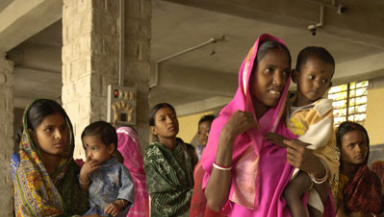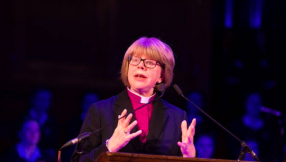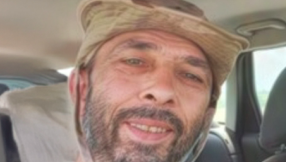India's Prime Minister Narendra Modi was swept to power in 2014 on a promise to deal with the corruption and inefficiency that bedevils the country's public life – and to assert the Hindu character of the nation.
Now embattled and facing a crisis of popularity because of a decision to withdraw banknotes from circulation – hitting India's poor and middle classes and threatening its economic growth – he's more than ever reliant on the Hindu religious right that backed him for the premiership. Modi's BJP is the political wing of the Rashtriya Swayamsevak Sangh (RSS), a Hindu Nationalist organisation promoting the belief that India is Hindu and that minority religions – like Islam and Christianity – are inferior faiths.
And a deep suspicion of the activity of foreign Christian organisations has led to a crisis for one of the largest and longest-established working in India today. Compassion International, which supports more than 145,000 babies, children and young adults through local church partners, has warned that it might have to halt its work altogether after 48 years.
It's because the Indian government has stopped it from passing funds to its partners on the grounds that it's illegally converting people to Christianity – an allegation flatly denied by Compassion.
According to Compassion, the Indian government ordered in February that "prior clearance" would be needed before funds could be transferred to its partners. It says: "After months of unsuccessfully trying to obtain prior clearance, we have concluded that the clearance process is fiction. We have never been offered an explanation for this action in the nine months since the order was issued."
Many of its partners have run out of funds entirely, while others are running reduced services.

In an article for The Hill this week, Compassion's President and CEO Jimmy Mellado warned that the organisation's work could be brought to an end there. Citing a Guardian article, he says India has shut down 25 foreign-funded organisations since the accession of Modi's BJP party. The Guardian article refers to a leaked Intelligence Bureau report to Modi saying NGOs that highlight issues such as caste discrimination, human rights or environmental concerns were part of a "growth-retarding campaign" to discredit India internationally.
Mellado says: "India's actions should shock human rights advocates and all who value the United States' relationship with the world's largest democracy."
He continues: "Compassion has committed no crimes, broken no laws, and to date has received no formal notice of illegal actions or a response from the Indian government."
An intensive lobbying campaign by Compassion bore fruit this week as its representatives testified before a Congressional hearing. Compassion's general counsel Stephen Oakley was scathing about India's Ministry of Home Affairs, saying: "MHA knows that they can use the inefficiency and massive delays of the Indian bureaucracy as a weapon – forcing charities like Compassion to either accept their determinations, or spend years seeking redress in a painfully slow and often corrupt legal system.
"In short, India's Home Ministry is using those aspects of India's bureaucracy, which are most in need of urgent reform, to systematically target NGOs with agendas and views that differ from its own."
Oakley said Compassion would be willing to work with the Indian government to address concerns over particular partners. However, Compassion denies it has a conversion agenda. Its US communications director Tim Glenn told Mission Network News: "The government is concerned that we are trying to change their culture. They're worried about the influence that we might have. But what you have to realise is that Compassion's program works solely with local church partners in the countries where we serve. So we're not there creating churches, we're not there trying to create any kind of religion. We're there working with churches that are already doing God's work in that country. We're just supporting them and providing them programs so they can do their work. I think that if people understood that, it would dramatically change their perception of Compassion."
And, he said: "If you're living in India, I can understand this fear of outside organisations trying to come in and change your culture. But that fear is based on a misunderstanding of what Compassion actually does. We're in India, and we've been there since 1968. We're not there to change culture; we're there to lift children up from poverty. We're there to feed them and to provide them opportunity for education and to teach them life skills so they become employable as adults."
The initial response of the Indian government to the Congressional hearing was to defend its position on Compassion. However, a senior Home Ministry official told India Today: "We are ready to reconsider the case of Compassion International, the US donor, which was put under 'prior permission category' for alleged violation of Foreign Contribution Regulation Act (FCRA)."
It's a chink of light in an otherwise dark picture of official obfuscation and delay, motivated – Compassion believes – by an unfounded suspicion of the motives and practices of an organisation that's only seeking to do good.
As Mellado says: "Compassion wants nothing more than to continue supporting India's children and families, and we respectfully urge Prime Minister Modi to immediately and unreservedly reverse his government's decisions and release the funding that India's poorest desperately need."
And he calls on the US, including President Obama and President-elect Trump to "boldly intervene in this situation".
It may be that Compassion – an evangelical cause that has wide support in the US and in 13 other countries – is able to avoid the total collapse of its work in India thanks to diplomatic pressure. However, the underlying issues for how India perceives its religious minorities – and anyone who dissents from the official line on contested issues like human rights – remain. Its prime minister's political difficulties are unlikely to make it easier for him to make concessions to Christian organisations that will risk alienating his core supporters. And whatever lies ahead, it will be the poorest who suffer most.
Follow Mark Woods on Twitter: @RevMarkWoods













